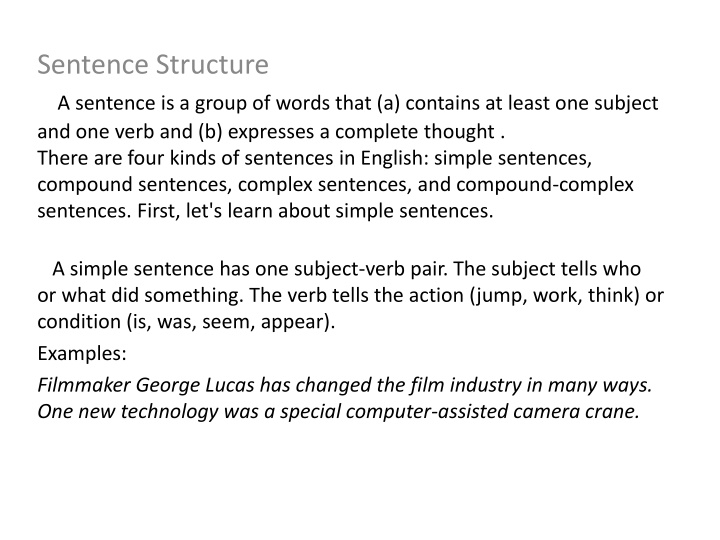
Sentence Structure, Capitalization Rules, and Examples
Learn about sentence structure, types of sentences, rules of capitalization in English, common mistakes to avoid, and how to correct them with helpful examples. Enhance your writing skills and clarity in communication.
Download Presentation

Please find below an Image/Link to download the presentation.
The content on the website is provided AS IS for your information and personal use only. It may not be sold, licensed, or shared on other websites without obtaining consent from the author. If you encounter any issues during the download, it is possible that the publisher has removed the file from their server.
You are allowed to download the files provided on this website for personal or commercial use, subject to the condition that they are used lawfully. All files are the property of their respective owners.
The content on the website is provided AS IS for your information and personal use only. It may not be sold, licensed, or shared on other websites without obtaining consent from the author.
E N D
Presentation Transcript
Sentence Structure A sentence is a group of words that (a) contains at least one subject and one verb and (b) expresses a complete thought . There are four kinds of sentences in English: simple sentences, compound sentences, complex sentences, and compound-complex sentences. First, let's learn about simple sentences. A simple sentence has one subject-verb pair. The subject tells who or what did something. The verb tells the action (jump, work, think) or condition (is, was, seem, appear). Examples: Filmmaker George Lucas has changed the film industry in many ways. One new technology was a special computer-assisted camera crane.
Simple sentences are easier to write and read, but complex sentences are also needed in academic writing. However, students should make clarity a priority, and avoid writing very complex sentences until they feel confident in their ability. Complex sentences contain conjunctions, relative pronouns or punctuation, which link the clauses: -In 2005 the company produced over 135,000 vehicles but between 2005 and 2006 production increased by 20 per cent. -Over 164,000 vehicles were produced in 2007; by 2009 this had fallen to 123,000.
The Rules of Capitalization The rules of capitalization in English can be quite confusing. Most students understand that they should begin a sentence with a capital letter. They also understand that proper nouns (e.g. Mark, Mary) should be capitalized. However, the most common mistakes occur with national adjectives and the names of languages. You should Capitalize I Capitalize the names of countries. Examples: Japan, America, Russia Capitalize national nouns and adjectives. Examples: Chinese, Russian, French, British Capitalize the first letter of the first word in a sentence or question. Capitalize proper nouns (i.e. the names of people). Examples: John, Mary, Annie Do not capitalize common nouns. Examples: boy, tree, flower, butterfly Capitalize the names of institutions, organizations etc. Capitalize the names of festivals. Examples: Eid, Diwali, Easter, Christmas
Study the examples given below. He went to university. University is a common noun and hence we do not capitalize it. He went to Oxford University. (NOT He went to oxford university.) The names of universities, organizations, institutions, mountains, deserts and rivers are capitalized. Note that when you write the name of a university or an organization, all words in the name begin with capital letters. Examples British Broadcasting Corporation (NOT British broadcasting corporation) United Nations Organization (NOT United nations organization) Notes In British English, the article the is not normally used before the names of universities, public buildings or organizations. However, in American English, the is more often used in such cases. He studied at the Harvard University. (US) Correct the mistakes in the following sentences. 1. He introduced me to mary, his wife. 2. I don t understand french, but I can speak a little spanish. 3. They went skiing in the alps. 4. She bought a new Car for her birthday. 5. Peter comes from new england. NOTE :Check your book for more information
